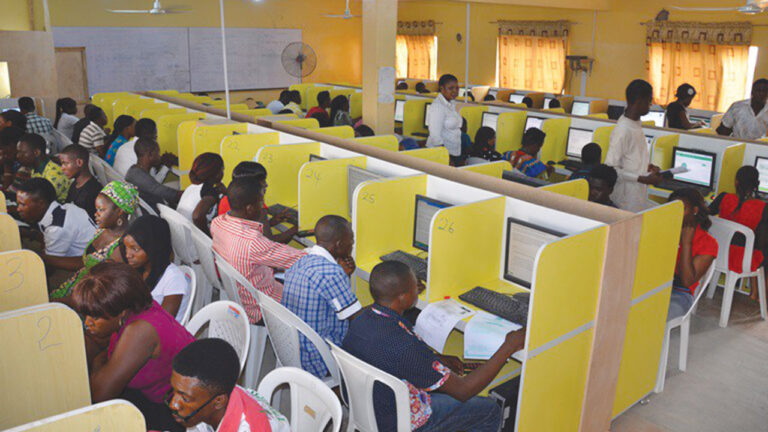Despite a rescheduled examination aimed at addressing technical glitches, over 1.3 million candidates representing 70.7 per cent scored below 200 out of the obtainable 400 marks in the 2025 Unified Tertiary Matriculation Examination (UTME), a revised results analysis from the Joint Admissions and Matriculation Board (JAMB) has revealed.
The Board on Sunday announced the release of results of the 2025 UTME resit, which was conducted for candidates affected by the technical disruption that marred the earlier sessions.
The revised statistics came after an initial result analysis by the board had shown that more than 78 per cent of the nearly 2 million candidates who sat the exam failed to cross the 200 mark threshold, sparking nationwide outcry.
In response to public concern and reports of technical disruptions, JAMB rescheduled the exam for over 300,000 candidates whose initial results were compromised by a system glitch affecting 157 centres, located in Lagos State and the South-East zones.
According to a statement signed by JAMB’s Public Communication Advisor, Fabian Benjamin, the results of UTME resit were released following a review meeting involving Chief External Examiners (CEEs) across the country.
The meeting, which had in attendance key education stakeholders, deliberated extensively on the integrity of the resit and broader concerns affecting the conduct of public examinations in Nigeria.
The board revealed that a total of 336,845 candidates were eventually rescheduled to retake the UTME, out of which 21,082 candidates failed to show up.
Pattern of performance
The revised results analysis shows that only 17,025 (0.88 per cent) candidates scored 300 and above; 117,373 (6.08 per cent) scored 250 and above; 565,988 (29.3 percent) scored 200 and above while 1.365,479 (70.7 per cent) scored below 200.
Though the new performance figures showed a slight improvement from the preliminary release, it highlights ongoing problems in Nigeria’s exam system.
JAMB noted that despite ongoing inquiries, performance analysis remains consistent with results from the past 12 years.
A comparison of UTME results since the inception of CBT in 2013 released by JAMB shows that majority of candidates consistently fall below average, with over 70.7 per cent (1,365,479) scoring below 200 in 2025; 76 per cent (1,402,403) in 2024; 76.64 percent (1,166,787) in 2023; 77.5 per cent (1,327,445) in 2022; 87 per cent (1,143,740) in 2021; while 79 per cent (1,515,717) scored below 200 in 2020.
In 2019, 76 percent (1,397.019 candidates) scored below 200; 74 per cent (1,206,508) in 2018; 73 percent (1,232,496) in 2017; 66 per cent (1,091,311) in 2016; 69 per cent (1,010,489) in 2015; 85.5 per cent (1,370,369) in 2014 and 89 per cent (1,533,080) in 2013.
The statistics show a worrying continuation of a decade-long trend of underperformance in Nigeria’s university entrance exam where candidates struggle to hit the top scores.
However, the 2025 UTME had 17,025 (0.88 per cent) of 1,931,467 candidates score 300 and above, which is the highest percentage in 13 years of CBT. In 2024, 8,401 (0.46 per cent) of 1,842,364 candidates scored 300 and above; 5,318 (0.35 per cent) of 1,522,476 candidates in 2023; 5,833 (0.34 per cent) of 1,713,252 candidates in 2022; and 724 (0.06 per cent) of 1,312,390 candidates in 2021.
In 2015, only 40 (0.003 per cent) of 1,466,269 candidates scored 300 and above while in 2013 and 2014, not a single candidate hit that score bracket, according to official records.
Meanwhile, the number of candidates that scored 250 and above in 2025 rose to 117,373 (6.08 per cent), the highest since the CBT began, which is a significant jump from 77,070 (4.18 per cent) in 2024 and 56,736 (3.73) per cent in 2023.
Experts review, confirm results
After the conduct of the UTME resit, a meeting of the board’s CEEs in all states of the federation was held to consider the results, after which a
Mr Fabian noted that a sub-committee led by the vice chancellor of the National Open University of Nigeria (NOUN) and CEE for the FCT, Olufemi Peters, a professor, was constituted to verify the integrity of the results.
He further made known that the CEEs also invited Boniface Nworgu, a professor and renowned psychometrician, to analyse and endorse the results ahead of their release.
In a magnanimous gesture aimed at fostering inclusivity, the meeting resolved to release the results of under-aged candidates who had earlier scored below the admission threshold, provided their cases were not under litigation.
However, the board reiterated that such candidates remain ineligible for admission, as they had signed undertakings to that effect during registration.
For absentee candidates, particularly those with valid excuses for missing either the main UTME or the resit, JAMB offered a second chance through participation in the forthcoming mop-up examination.
While the board noted all results have been released except those of candidates who committed examination infractions and those slated for mop-up examinations; it resolved to release results of candidates previously flagged for online solicitation of illicit assistance via WhatsApp and other channels.
It clarified that the decision to do so does not amount to an endorsement of misconduct but serves as a one-time waiver as candidates were sternly cautioned against participating in anti-social or dishonest platforms in the future.
High score claim debunked
JAMB also cautioned against misleading claims on social media, citing a notable case Olisa Chukwuemeka, a first-year public health student at Adekunle Ajasin University, Akungba-Akoko, who falsely claimed a 2025 UTME score of 326 via X (formerly Twitter).
Upon investigation, it was discovered that Mr Chukwuemeka had manipulated his 2024 score of 203, presenting it as his 2025 result. His actual score in the 2025 UTME, taken in Lagos before being nullified, was 180.
According to the board, he has since deactivated his X account, following the exposure of his deceit.
Crackdown on CBT centres, tutorial schools
The meeting took a hard stance against erring CBT centres and tutorial centres found to be complicit in organised examination malpractice.
While implicated CBT centres are to be blacklisted, with their complicit owners and operatives facing prosecution, individuals who directly registered candidates with modified pictures and biometrics are also being tracked for arrest and prosecution.
Tutorial centres also came under intense scrutiny, with the CEEs urging governments at all levels to introduce stringent regulation and licensing frameworks for their operations. The board warned that many of these centres serve as incubators for unethical behaviour among students.
Malpractice: 3,000 candidates under investigation
During the 2025 UTME, JAMB said it uncovered high level malpractices, which led to the withdrawal of some results and the arrest of several culprits across the country.
According to the board, over 3,000 candidates nationwide have been identified as either accomplices or beneficiaries of the ‘extraordinary examination fraud.’
Investigations by security agencies revealed collusion of certain CBT centers, school proprietors with the connivance of accredited centres to hack the networks of targeted centres, thereby gaining control of candidates’ computers and remotely submitting their responses to the relevant local server of the centre.
Other key findings are: hackers linked to certain centres breached local servers to control candidate systems and submit pre-filled responses; blending of candidate photos with those of impostors using artificial intelligence (AI); use of combined fingerprints from multiple individuals during registration; extension of examination networks to unauthorised ‘strong rooms’ and disrupted seating and mercenary pairing as candidates were paired with hired writers who had registered to access exam halls.
JAMB threatened that all candidates confirmed to have engaged in or benefited from these malpractices will have their results withdrawn once investigations yield conclusive evidence.
Candidates to recheck result, JAMB clarifies SMS charges
JAMB has asked candidates with earlier released results to recheck as recent discoveries by the security agencies have necessitated the withdrawal of some of the results of implicated candidates across the country.
It noted that candidates affected by the withdrawal are being notified through text messages on their registered lines, profiles and emails.
While announcing the results, the board clarified that only candidates involved in malpractice or scheduled for mop-up exams still have pending results.
It dismissed rumours about profiteering from result-checking SMS codes (55019/66019), explaining that it does not earn revenue from the platform but subsidises the shortcode services to protect the critical data of the candidates and to curtail cybercafé extortion during their desperate check for results.
Endorsement of CBT, operational reforms
Despite the challenges, the CEEs reaffirmed their faith in the CBT model, noting its contribution to curbing malpractice and advancing the nation towards a digital society. “Despite some shortcomings, CBT remains the viable option for ensuring a malpractice-free examination process,” they said.
The meeting acknowledged the detailed and rigorous processes adopted in the accreditation of CBT centres, advising that a reputable firm of management consultants be engaged to review and improve the process of accrediting CBT centres, registration procedures, and other critical operational stages.
Experts had earlier warned of a deeper crisis that numbers alone cannot capture. According to an educationist, Yomi Otubela, what the initial performance statistics have revealed is more than individual shortcomings but the deep-rooted systemic issues in the nation’s education landscape.
Mr Otubela, the National President of National Association of Proprietors of Private Schools (NAPPS) Nigeria, identified foundational failure as one of the factors responsible for poor performance, where many schools are overcrowded, underfunded, and have poorly trained teachers, leaving students unprepared.
Offering a way forward, he stressed that JAMB must evolve beyond merely conducting examinations, urging the board to take on a more proactive role in preparing candidates, particularly those from disadvantaged backgrounds, for CBT.
“JAMB should provide free CBT simulations across the country, make past questions and exam formats publicly accessible, and partner with schools to deliver digital readiness sessions that help bridge the gap.”
Mr Otubela further encouraged all stakeholders including government, school owners, parents, and policymakers to return to the roots of education reform.


